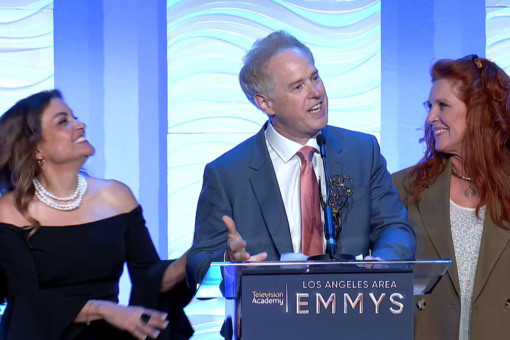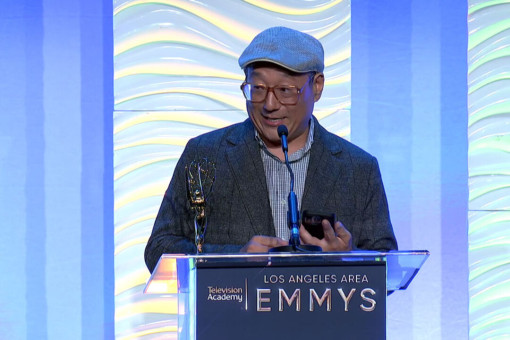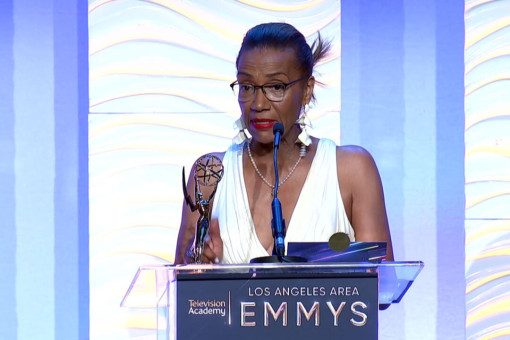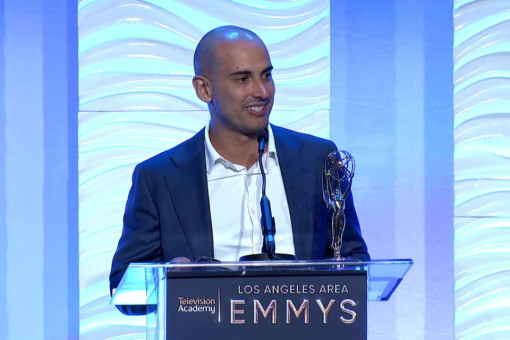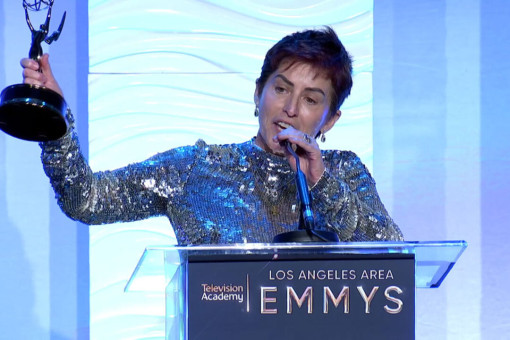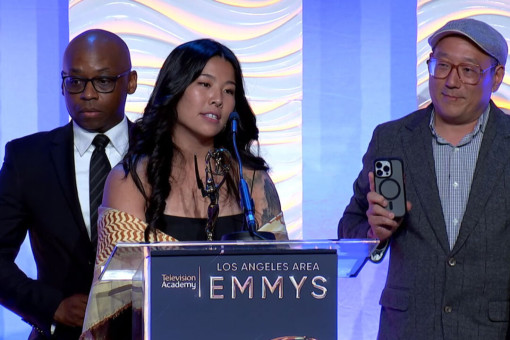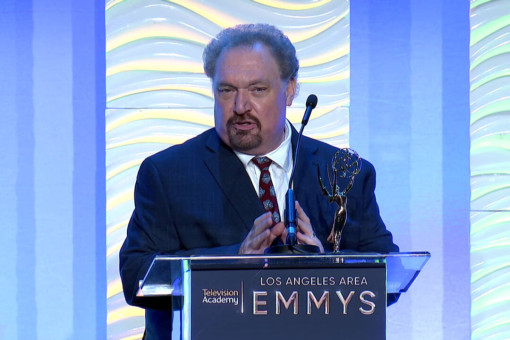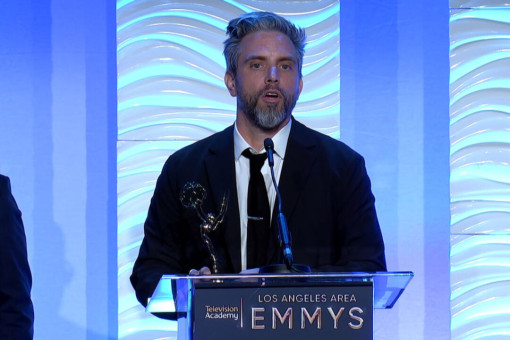"KCET will never be the same. I already feel an emptiness in my heart without you."
"I heard you were going to retire, and I wanted to say thank you...... your smile and style have always been so unique to me......"
"You have played such a pivotal role in Los Angeles in lifting the voices of those who are often unheard."
As journalist Val Zavala leaves her post at public television station KCET at the end of this month, tributes like the ones above are pouring in by the hundreds to that station's website as "Val-entines."
After three decades with the station, Zavala is known to loyal viewers as a journalist possessed of great personal style, a smooth voice, a focus on substantive, in-depth reporting on the city of Los Angeles and – as one tribute writer put it – the ability to make you feel smarter just for having witnessed her reporting.
Zavala has been a force on several of KCET's flagship series, including Town Hall Los Angeles and Life & Times, for which she served as a reporter, anchor and executive producer (2004-2008). Currently anchor and producer of the newsmagazine SOCAL CONNECTED,
Zavala is also the winner of 18 L.A. Area Emmys, of which she said, "When it comes to awards, nothing gets people's attention like Emmys. I have various awards on display but people always want a picture holding an Emmy. Those are the ones people's eyes get big at."
But she's humble about her role in winning them, often deflecting the credit to her colleagues, as well as to public television in general, which she said has the right value system to allow her the long and storied career she has.
"I've gone through many fluctuations here and many evolutions and they've always been committed to news," Zavala said.
Zavala, as a reporter, puts a viewer at the center of in-depth pieces, including those on recent episodes of SOCAL CONNECTED about the endangered Channel Islands Fox (brought back from the brink of extinction) and a profile of an Islam school in the heart of South Los Angeles.
But her versatility is apparent when you look back at her work, which includes pieces like the one-minute explanations of the myriad 2016 California Ballot Propositions, which won a Walter Cronkite Award. The idea sprouted during summer hiatus and evolved to having Zavala dissect each initiative in a minute or less while animations appeared behind her. People loved them.
"We said, 'you know what, no one understands these things, except for maybe the one about making pot legal, why don't we make it easy? I bet we can explain every prop in one minute, because everyone will watch for one minute."
Zavala will no doubt be missed by her colleagues, some of whom appear in a special tribute episode of SOCAL CONNECTED called "30 Years With Val Zavala" at 8 p.m. Tues., Feb. 13 on KCET (encore at 7:30 p.m. Wed., Feb 14).
Hosted by KNBC's Fritz Coleman, the half-hour retrospective features numerous special guests, among them Los Angeles Mayor Eric Garcetti, filmmaker John Ridley, KPCC's Larry Mantle, KCRW's Saul Gonzalez and Warren Olney, who recall Zavala's role in covering some of the region's most critical events and key influencers of our time.
As she wraps up her esteemed career, it's clear that she has no shortage of ideas or energy to develop more stories, but that she's secure in stepping aside to make way for new talent.
She also has thoughts on journalism: "The message I convey at the end of the goodbye show, is that journalism is in a crisis right now, there's not a lot of trust and that's fueled by a lot of people wanting to undermine the media and journalism. But I think people have to understand, journalism can be trustworthy but it requires your sources and the public to trust us first.
"I can come out and do a story and the real trust that's occurring is between you (the source) and me the journalist. .. I get to ask you questions I want, you get to answer them… I get to craft whatever story I want and you do not get to see it until it hits the air. That trust that you are willing to give me, and the many hundreds of people I've interviewed, that's where trustworthy journalism starts from.
"Obviously, I have to have integrity and journalistic standards, but I [need] cooperation from sources who trust me to do a good story."
We spoke to Zavala as she prepares to leave for a retirement during which she will do "simple things slowly."
So, what's on your mind as you leave?
The first thing is that I'm very lucky to have been at one station for 30 years. That doesn't happen very often in broadcasting. I attribute that to the fact I'm in public broadcasting and you don't get let go for a bad hair day or because you put on seven pounds.
People take news coverage for granted but it costs money. For a public television station to raise money and be committed to local public affairs in one form or another for 30 years is really rare and I've been the beneficiary of that.
Well, they're the beneficiary, too, to have had you for that long. But you're right, the quality of the content you produce goes deeper, and seems to really know the people in L.A. How do you find the show and what it will be?
It does depend on the format. Life and Times was much more current. We were live twice a night and we taped within a week so we could be much more topical. Now, we're a news magazine and what we broadcast has to be able to be aired again … months from now. We can't be as topical but we still have to be current.
So for example, homelessness, we know will remain current as its going to be with us for a while; environmental issues, they don't change really fast from week to week. Profiles of people who are doing amazing things, those work really well. We've always been able to be more in-depth, five six, seven, eight, even 10 minutes long.
Do you think that's another benefit of being on public television, the ability to hit an issue hard as opposed to having to come out with a crazy headline?
Exactly right. We've never seen ourselves as competing with newscasts. We haven't had to listen to consultants who say, "you need five pieces up front and the first one has to be titillating or dramatic."
So, when people say, "You've won so many Emmys, you must do great work," that's true but, let's put it this way: if you were a great cook but you were employed at McDonalds, you probably couldn't dish up really wonderful dishes. So I'm lucky I've been employed at a nice "boutique café" and we can serve a totally different kind of menu, because we're not in a fast food/fast news business.
But on the Emmys, what do you do with all those statues?
About six or seven are at home because my husband likes to show them off on our mantle. A good handful of them are here but they will all eventually go home with me when I retire. And then when I'm six feet under, I think they'll come back to KCET. The idea of them landing in a landfill is such a horrible image, I will make sure they get back to the station.
Do you have one with particular meaning to you?
I think it was for a story I did on inner-city arts, a wonderful nonprofit artspace right downtown before downtown got all hip and cool. I did this story on the fellow who founded it. He literally had a dream that was about founding an artspace for low-income kids. That one is special because it was a story that was my own.
With your special coming up, all these people paying tribute to you. And then your special seems to have people coming from all sides to talk about how great you are. (pause) Oh gosh, I hope I'm not spoiling the surprise!
No, I know about it! And yes, was great to have Fritz Coleman come in and host it, he's such a great friend to public television, such a funny warm guy. Larry Mantle is wonderful and we sort of grew up together in public broadcasting, as I did with Warren Onley. Saul Gonzalez is a colleague and we worked together very closely. He's so smart and so much fun. I'm so fortunate there are enough people to say nice things about me.
In journalism, it's also not bad to maybe – not make enemies – have some people who maybe remember you less fondly because you broke a story that they wished didn't come out.
I'm not a Mike Wallace, that's not my style. I don't hit hard and go in for the kill. My most critical one was on LADWP – their salaries were so much higher than other city employees, and the unions were very strong, many people say maybe too strong. There was a thought the city was being loyal to the union instead of the ratepayers. So I don't think I'm the best friend of the head of the union there.
Overall, even if we've been critical but I think we've been balanced. If they're looking back, I thnk they they might say we were generally fair.
When you get it right, no one can really be angry. I think what's greatest, though, is seeing all these tributes on the website from fans of yours. Everyone loves you and is going to miss you.
I have to show them to my husband.
And he has to get you a really good valentine.
Social media manager said there was one person who was convinced I was being forced out and I said don't worry, I'll answer that one personally.
I didn't see that one but it's overwhelming how many people are already asking what you're doing next or when you'll be back. You probably don't want to think about that yet. But do you have something next you really want to do, or do you want to really retire and what you do will be a surprise to you?
There are things I can do but I think for the first time since I was a 5-year-old kid enjoying a summer, I'm going to really do almost nothing. I'm just going to kick back and relax. You have to change gears, and to change gears you have to slow down for a bit. So I'm not going to jump into a lot of other stuff. I want to do simple things slowly.
I want to garden, I want to do yoga, I want to do my meditation. We got a dog. I love our dog! I want to walk the dog.
What's the dog's name?
Casey. She's darling, a small rescue Lab, about 35 pounds. My husband and I don't have kids so we're totally devoted to our new dog.
How old is she?
She's not a puppy, she's 8. We knew we could not possibly handle a puppy, we know our limits and we like our furniture too much. So it's dogs, yoga, nature, hiking, a lot less screen time, a whole lot more nature.
That sounds wonderful.
Really and truly, I believe you need to move aside and make way for younger folks who need opportunities. I really don't believe in sticking around too long. You have to move on and it's not hard for me, as I'm going to enjoy retirement. And if you don't hang around, I really think they will find other talent who needs the opportunity I had.
So, I'm very serious, I'm not eager to do much television. I just don't want to. I think it's better for them to tap into younger talent and develop that talent.
That's incredibly generous and kind of you.
And lazy.
Well, you deserve it. Speaking to the next generation, though, this is an interesting time right now with our political climate and everything going on around women speaking out. For you particularly, as a Latino woman who's been a pioneer in this industry, who stuck with one station without as you said, getting moved around for totally superficial things, what are your thoughts on where we are now?
It goes back to the difference between commercial and public television.
Commercial television and news and now cable news, you can tell what their values are simply by watching, and when you see nothing but women between the ages of 30 and early 40s with a certain look - that former cheerleader with beautiful figures and lovely faces and heaven forbid, anyone over 45 isn't allowed on the set – [it's] not to say they're not talented or intelligent but [the stations] are projecting what they believe women should be like.
There are some exceptions. But generally, a lot of women these days if they grew up watching television and looking at women reporters, they would say, 'well, I'm not pretty enough to be on TV.' They would just eliminate themselves. That's unfortunate but that's what commercial television does.
I think there are different sensibilities and value systems in public television for sure. I find that a lot of women who are serious about journalism but may not have that perfectly cute Megyn Kelly look, they're in digital, they're in NPR and radio and they're finding ways to be creative but it's just a shame that the cosmetics still play a fairly large role for women – more than men – in commercial news.
Especially because your reporting is so compelling, though I think you're beautiful, too. I understand what you mean that cookie-cutter look, it almost becomes indistinguishable and it's sad that that's a demand. So, what do you say to the idea that the internet has opened up the ability to start something on your own – a podcast, a video series, that kind of thing. Those can be difficult, costly and a huge undertaking but do you see that those homegrown efforts as a path in, for people who want to be more serious? And how does it compare to your way in?
I broke in in a very typical way. I went to journalism school, worked behind the scenes in a station in Baltimore doing gofer work for three years, and that was great because I really saw how a newsroom worked. I was running scripts, doing research, booking guests, but I understood how it worked.
When I finally had the courage to say, 'I think I want to report,' there was no such thing as self-producing so you have to ask a favor of a camera guy – 'will you shoot my stand-up for me on the weekend, edit it?'… find raw takes so you can put them on your reel. These days, everyone can do everything by themselves.
[After you make a reel], you have to get rejected by a dozen small markets and finally I got very fortunate and had the opportunity to start reporting in San Luis Obispo, which is a small market but it got me back to my home state.
Honestly if I were to start today, I don't think I would make it. I still think in the end, you're better off getting a job inside a news organization that can help you move forward. Whether it be NPR or a small station or CNN or wherever.
The advice I would give to a young person is, if it you can get into a news organization that produces on a regular basis you're still better off than trying to do it on your own. You want the credibility and you learn so much from everyone around you.







